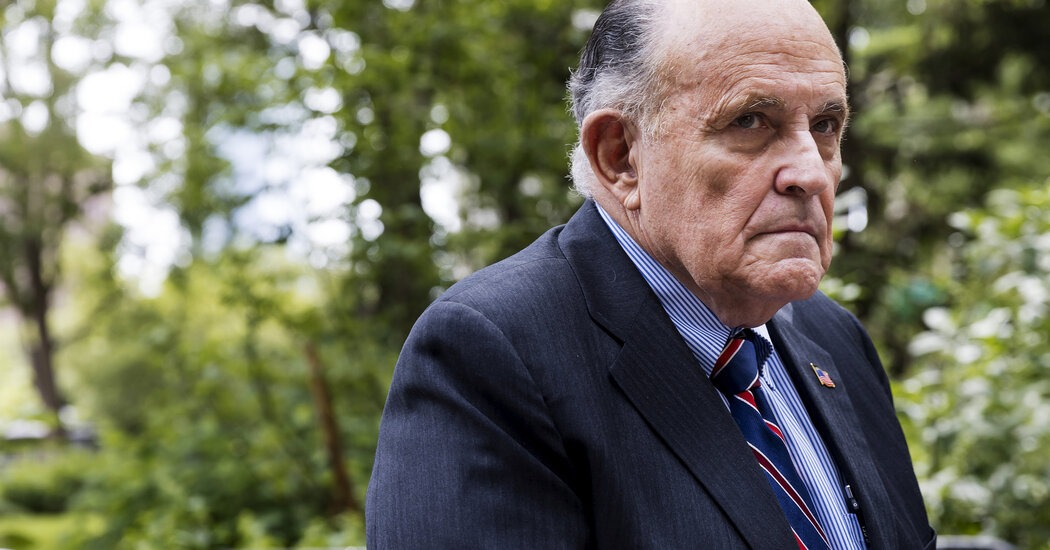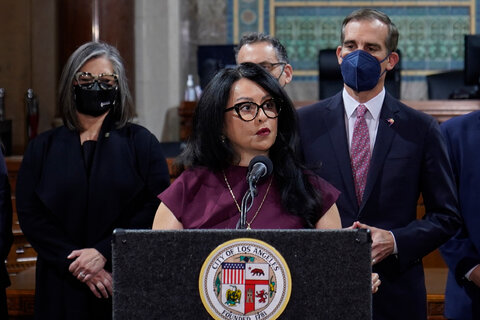
“When did Rudy Giuliani go off the rails?” is a question that many Americans and New Yorkers in particular have been asking for years now, arriving at no obvious consensus. Old-time observers of the local political scene like to revisit the time, two decades ago, when he famously berated an advocate of ferret ownership during a radio show, telling him that he needed “help” and that his “excessive concern with little weasels” was a “sickness.”
On the other hand — and maybe this is the point, there was an other hand — the guy had called into the show repeatedly, sometimes in the middle of the night, harassing people on staff, Mr. Giuliani argued. Maybe when you are dialing in at 3 a.m. to move the needle on ferret policy you really should be talking to someone.
Roughly a year later, in another turn unlikely to have won fans among practitioners of civility, Mr. Giuliani announced that he was leaving his wife, Donna Hanover, at a news conference in Bryant Park, having failed to tell her first. But really, what was to be done? Although he was running for the United States Senate, he was a man in love, someone who was putting politics “at least second,” he said to a stunned press corps, “maybe third, maybe fourth, somewhere else.” Soon he would drop out of a race that would land Hillary Clinton in office. Battling prostate cancer, he said that he would turn ‘‘more now than maybe I did before” to Judith Nathan, a nurse he met at an Upper East Side cigar bar, who would eventually become his third ex-wife.
Still, turn-of-the-century Rudy Giuliani, rebounding from missteps, as America’s mayor in the wake of Sept. 11, was very different from the version we have seen more recently — the unhinged reality denier, he of mysterious leakage seeping from his temples, host of a political news conference inexplicably held at a landscaping facility, a subject of investigations both by the Justice Department and the state of Georgia into efforts to subvert the results of the 2020 presidential election.
And yet even that Rudy Giuliani, the onetime Mafia-busting federal prosecutor, who had come to direct a combative rage at the serious business of thwarting democracy, would seem to have little in common with the man who this week chose to make an enemy not out of global drug traffickers, or the American ballot system, but rather a 39-year-old supermarket employee who didn’t like him.
As if downgrading from a taste for Mortal Kombat X to Magic the Gathering, Mr. Giuliani was going after Daniel Gill, a ShopRite worker who the former mayor claimed had attacked him at a campaign rally for his son, Andrew, who made an unsuccessful bid to become the Republican nominee for governor. According to police reports, Mr. Gill called the former mayor “a scumbag” and apparently railed against his position on abortion. He was subsequently charged with second-degree assault and spent a night in police custody before a video emerged showing the assault as something more benign — a pat on the back. Mr. Gill was ultimately arraigned on misdemeanor counts.
Appearing on “The Daily Show With Trevor Noah” on Tuesday, Mayor Eric Adams weighed in, comparing his predecessor to the woman who had falsely accused a Black bird watcher of threatening her in Central Park two years ago. As he had earlier, the current occupant of City Hall claimed that Mr. Giuliani should be investigated for falsely reporting a crime. Unwilling to grab a thesaurus, the former mayor responded by calling the present one “a scumbag.” But even the conservative news anchor Greg Kelly questioned Mr. Giuliani’s account of events. “I gotta be honest,” he told him during an on-air interview, “it doesn’t look that bad.”
Mr. Giuliani, though, was not having it. Who knows what could have happened to him? — serious injury, maybe even death. He was old — “elderly,” in his own words — and apparently content with becoming the new face of fragility politics. That all of this went down on Staten Island — where voters overwhelmingly voted for Donald Trump twice — seemed to challenge his worldview in a way he could not reconcile. “I carried 85 percent of Staten Island,” Mr. Giuliani said of one of his mayoral elections during a news conference streamed on Facebook, as his head sunk into the collar of a white button-down shirt with wide horizontal stripes that seemed to say, “I once played rugby.”
He went on: “Guy Molinari used to joke that the only people on Staten Island who voted against me voted against me by mistake.” What had happened? Staten Island, for one, was becoming an important spot in a growing national labor movement. Maybe there were fewer safe spaces left.




